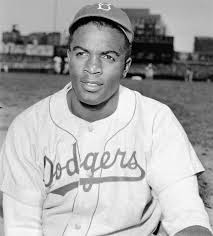Today I am invoking, once again, my Howard Cosell Rule: This post won’t be about bicycles or bicycling.
Almost any someone breaks a barrier—whether it’s based on race, gender, social class or some other trait—that person is referred to as the “Jackie Robinson” of their field. In fact, I had that title bestowed on me when I was the first person to “change” gender in my workplace.
I took that both as a compliment and a warning: I think some were trying to alert me to what I might (and indeed did) face. On the other hand, I felt honored to be compared to someone I so respect as a human being as well as an athlete.
That respect and admiration is not abstract or idolatory: I actually met the man when I was very young and—as I could not have known—he was a few years away from the end of his too-brief life. Years later, I met his widow Rachel, a beautiful and formidable woman.
The man I am about to mention also, when he was very young, met Jackie. At that time, Robinson was in the prime of his baseball career. And the subject of the rest of this post would embark on his own athletic career, in a league where no one like him played before.
Sixty-six years ago yesterday—18 January 1958–Willie O’Ree’s skate blades glided across the ice in the Montréal Forum. The hometown fans cheered him and the following day, the city’s sportswriters—lauded his fast, smooth skating.
That Montréal scribes could pay homage to the abilities of á forward who didn’t skate for the hometown Canadiens (Les Habitants) wasn’t unusual, Their praise, however, was particularly interesting given that O’Ree wore the sweater (they’re not called jerseys in hockey) of the Boston Bruins, whose rivalry with the Canadiens is as intense as the enmity between the Red Sox and Yankees.
Oh, and he just happened to be the first Black player in the history of the National Hockey League. That night, Willie was trying to prove himself and win a permanent roster spot in the sport’s top league. “I did not realize I had made history,” he recalled.
Somehow it seems fitting that he is a descendent of slaves who escaped from the United States into Canada via the Underground Railroad. His family was one of two in Fredericton, the capital of the Canadian province of New Brunswick. Like many of his peers, he grew up as a fan of the Canadiens.
His NHL career was brief, but he played professional hockey—and won scoring titles—well into his 40s. I can’t help but to think that as supportive as his teammates and the league’s fans—in Boston, Montréal and Toronto, anyway—were, racism, conscious or not, on the part of management hindered his development. After all, he had enough natural ability for Montréal sportswriters and fans to notice. But he needed to stay in the NHL longer than he did—parts of two seasons—to refine his skills in the way only nightly competition with and against the best players in the world could have. That is what Jackie Robinson was able to do during his decade with the Dodgers.












